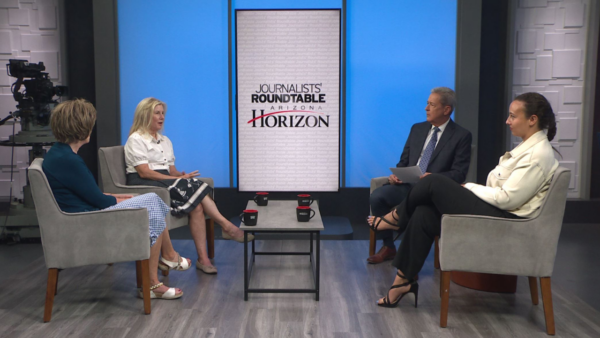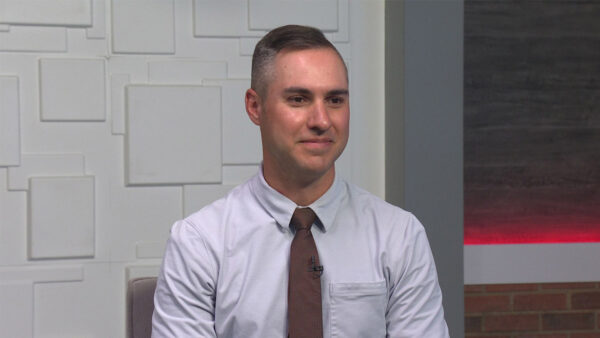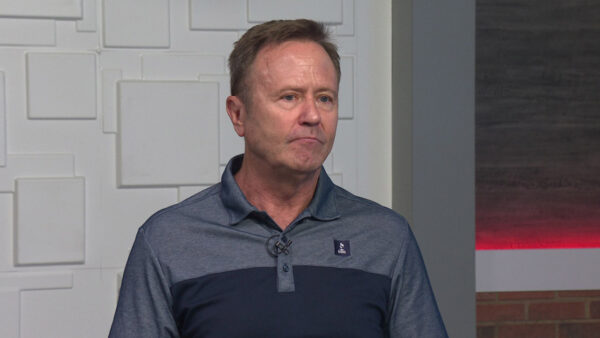A national report on hunger reveals the problem has increased tremendously during the past four years. Ginny Hildebrand of the Association of Arizona Food Banks and Bob Evans of the United Food Bank in Mesa will discuss hunger in America and Arizona.
Ted Simons: A new study reveals that hunger has increased substantially over the past four years. I'll talk to two food bank executives who deal with feeding the hungry every day. First, Mike Sauceda tells us more about this new report.
Smile pretty for the camera.
Deborah recently moved to Phoenix, getting a week's worth of food from Saint Mary's Food Bank in Phoenix. Money is tight since Deborah and her husband have moved to the Valley.
Deborah: Yes, it is. Pay the rent and we're stretched out there.
Deborah joins many others in this bad economy who have never used a Food Bank before.
Deborah: Never done it before but it's going to be a welcome gift to us.
That's borne out by statistics from the latest survey of 61,000 food bank clients by Feeding America which represents 200 food banks from across the country, including Saint Mary's Food Bank, the first in the nation. The number of clients served increased by 46%.
Vicki Escarra: Another for us very interesting statistic is that clients who have been unemployed for less than a year, that number went up 68%. And the reason that's so important is that it really focuses attention on the fact that we are serving a lot of people that are coming to us for the first time, and don't really know how to use our services. So as we see unemployment and underemployment go up, that number is very important. A, because it is kind of the foundation around the increase that we're seeing. B, because we know that we will be serving those folks, certainly in the short to medium term.
Many of those first-time users have a tough time dealing with their need.
Vicki Escarra: You know, they do. You can tell when they come in. Typically if they have not been in before they obviously don't know the process. They are embarrassed. Oftentimes a lot of our senior citizens really are embarrassed because I think there's this feeling that most of them have worked all their lives and are living on a fixed income and never expected that they would have to rely on us for food assistance. On a positive note I will tell you that our network of food banks and people that work in these food banks and agencies are very accommodating.
Among the increases, a big jump in the number of kids who are not getting enough.
Vicki Escarra: An even bigger number and more compelling around the need and the crisis is that we saw increases from children that we served from 9 million up to 14 million nationwide, a 50% increase. And very concerning to us and to our network members because we know the impact of hunger on children specifically as they are growing. So from birth through about 16, if kids miss meals often, there is just a decline in their ability to learn, to grow, to develop psychologically. That is very worrisome to us.
But it's not just the jobless being served by food banks.
Vicki Escarra: We serve a great number of people that are employed. The statistics show that over 35% of the households that we serve have one working adult.
Ms. Conner says many of those skipping meals are making hard financial choices, with 46% having to choose between paying bills and eating.
Vicki Escarra: What we know is happening is that when people are at risk because they are unemployed or underemployed as a result of the economy, they are finding it really important to make their house mortgage, pay for any medical bills and so the thing that is really -- the vulnerability is food. They will go without food as opposed to being evicted from their homes.
Hunger is increasing but fortunately for food banks, so are donations, but not fast enough. We are fortunate with the Feeding America network that donations are up across the board. Above 20%, but you can see that closing the gap with the need being up 46% and donations being up 20%, we're continuing to do a lot of work in the community just to get people more and more aware of what's happening. And so we need to do more with this rising demand.
For people like Deborah the help was there when her and her husband experienced hunger.
Deborah: We've had a little stress but it wasn't that bad.
Ted Simons: Here to talk about hunger in Arizona is Ginny Hildebrand, president and CEO of the Arizona Association of Food Banks. Here is Bob Evans, as well, Chief Executive Officer of the United Food Bank in Mesa. Any surprises in the study?
Ginny Hildebrand: I think one of the big surprises was that there are so many people. We have one of the largest growth factors, 85% increase over the study that was done in 2006. So that's way different than even the national numbers.
Ted Simons: Again, was that a surprise to you, as well?
Bob Evans: To some extent. I think had this survey been done even 12 months later, the numbers would have been even worse. What we're into now is phenomenal.
Ted Simons: As far as Arizona is concerned, compare and contrast Arizona with the rest of the country.
Bob Evans: Ginny?
Ginny Hildebrand: Well, I think that one of the areas that we're very close is in terms of the number of people that are coming for assistance on average. We have about 122,700 people every month that are coming for assistance. And that's mirrored in other states, that same kind of percentage. I think one of the areas where we're very close also is the number of people that we're serving that are experiencing food insecurity. Nationally it's 76%, in Arizona it's 77%. But in families with children we have even more of an impact there in Arizona, we have more people.
Ted Simons: Is that what you're seeing as well?
Bob Evans: Yeah, absolutely. In our service area half of the families, members of the families are under 18 years old and it's just a mind-boggling number of folks out there needing help.
Ted Simons: How much is the economy a factor in all of this?
Bob Evans: It's absolutely a factor. It was bad before the economy tanked. It has just gotten worse and we're not out of it by any means.
Ted Simons: As far as Arizona is concerned, compare and contrast now the urban areas with the rural areas.
Ginny Hildebrand: We know that the rural communities -- we've been experiencing this for a long time -- but the rural communities are really struggling to make sure people in their communities have food. But they are also pulling from our regional food banks at a larger level, a high percentage of their dependency is on federal commodities, that kind of thing. In Arizona rural communities are suffering.
Ted Simons: When people watch this program they want to do something for food banks, what should they do? And what are you looking for as far as public input to help in this matter?
Bob Evans: We're always looking for food, funds and time. People can step up and conduct food drives and just walk in with a bag of food. Support your food banks through monetary donations or come and help sort food, be on board as directors, committees, any number of ways.
Ted Simons: Are you seeing, again, that kind of commitment and help? Is that diminishing a little bit as the economy gets worse?
Bob Evans: I'm not seeing that, I'm seeing it improve.
Ginny Hildebrand: Across all of our members they are reporting that they have more volunteers, more contributions. That's a good thing because we have record demand at the moment. I think this report acts as a mirror for Arizona to look in. When we look at the results of this report, it's staggering. A bad economy, yes, but it's also staggering to know so many children are impacted, so many elderly, so many disabled. I think it really says to us, Arizona, it's time for us to really sit down and talk about the hunger problem and poverty problem in our state.
Ted Simons: When someone does sit down and talk to you about the hunger problem and the poverty problem in our state, what do you tell them? What needs to be said?
Bob Evans: Just to become engaged, become involved. Have a dialogue with the legislators at the local level, the state level, at the national level. Speak your mind, let people know that you're concerned.
Ted Simons: Is there a lack of that, do you think? People just figure the hungry, the poor will always be with us, that sort of thing? And they kind of glide on by it?
Ginny Hildebrand: There is that philosophy, but I think the reality is, when was the last time you talked with your neighbors, the people in your service clubs, the people at work, the people in your faith community? When did you actually sit down and talk about what's happening in your community? I think as we get out and talk about it, and we have more opportunity to talk about, well, I could do this. Or we could bring this program to bear in our community. Summer Food programs go unutilized in Arizona at an alarming rate. What if we provided summer food for children when school's out of session? That's one little tiny thing we could do.
Ted Simons: The summer food program seems like something I've heard before, that is a factor, correct?
Bob Evans: Absolutely, but it's so underutilized, as is the SNAP program, the supplemental nutrition assistance program. We have these programs; they're just not being utilized. Sometimes all it needs is a champion, someone to step up and say I want this to happen at my school.
Ted Simons: What do you want to see people take from this discussion?
Ginny Hildebrand: I want them to take a point of discussion. I really would like to see -- I believe if more people came to the forum table, if you will, for their community, and started to talk about this, we have many different issues. Food sales tax, budget issues and lots of things coming up. If we started talking about it and saw where the connections were, I think it might help.
Ted Simons: Very good, thank you both for joining us.
Ginny Hildebrand:Association of Arizona Food Banks;Bob Evans:United Food Bank in Mesa;























